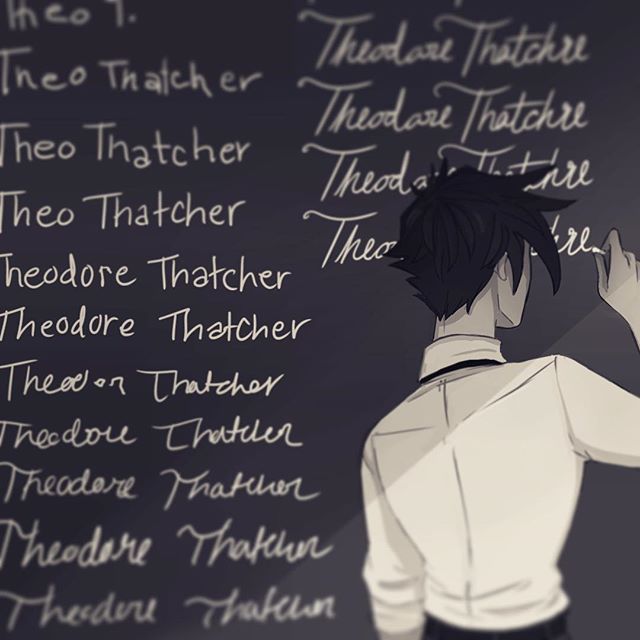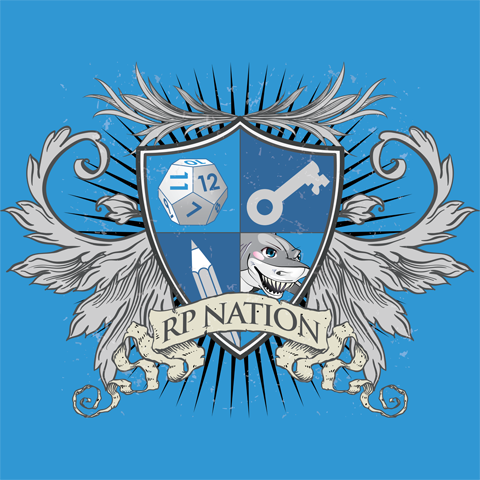M.J. Saulnier
Semi-Retired User
In order to really help me, you have to understand me and my RP journey so far.
Back in 2006 I joined an RP community called RPG Forums Online, or RPGFO. I was a 21 year old kid who had no writing experience and a grade 9 education. I couldn't write at all. I mean I was bad. I wasn't a borderline illiterate thug, I was a piece of fecal matter scraped from the boot of a borderline illiterate thug. Writing never came naturally to me. The most reading I was able to do was during my time spent in a provincial prison. I've had to work at this thing from day one, probably harder than most.
So what saved me? What redeeming quality allowed me to persevere and write alongside, learning from some of the RPGFO greats? My creativity. I was taught very early on that RP is not just writing, it is story telling. RP is 70% creativity, and 30% literacy. I spent roughly three weeks just lurking, snooping (something that would become a life-long habit). I needed to do my homework and find out what this role playing thing was all about. MY only knowledge of role playing prior to FO was a form of sex game. So I snooped every OOC and IC thread I possibly could, seeing what people were doing, what people responded to, and how they were telling stories as a group, each with their own characters. I still couldn't write, but I was getting a sense of what RP actually was. Being too respectful and self-conscious to join someone's RP and sully it with my ineptitude, I decided to create my own RP.
I came up with a concept involving unique vampires in a post-apocalyptic world that meshed American western with traditional fantasy. Somehow it became a resounding success overnight. Despite my total lack of organizational or literary skill, people wanted to be a part of this story. That was the moment I realized that creativity trumps literacy when it came to creative writing. For years afterward, I never had problems pitching a story. The only concept of mine that didn't gain traction in 13 years is my super hero universe.
Back in 2013 or 2014, I left role playing altogether. Haven't written anything since. Didn't scribble notes, didn't work on personal projects, didn't RP in chat rooms. Nothing. I always work on concepts in my head - it's like a freaking mental illness - but I didn't write at all. As such, my ability to flesh out the little details - or ranting as I affectionately call it - has all but faded away. No matter how hard I try to sit down and flesh out a post, nothing comes to me. Only the important details. Who did what, who said what, and why. I cannot get my ability to rant back, and it's killing me. I hate my own material now, and there's no feeling more nasty for a writer like me. I was never the type to sit and "Tolkien it up" for no reason, taking half a paragraph to describe the old oak tree in the background, and the young couple who were married under it 627 years prior. That's just not me. I believe too much detail weighs a post and narrative down. I like to prioritize, even a the cost of length. More isn't always good when you're doing multiple character interactions. You've got to know where and when the balance resides to really do good long-form.
So now I find myself only able to produce basic descriptions and dialogue. When it comes to combat I spring to life, because that will never leave me. It just comes as naturally to me as drawing breath. Nevertheless, I have stopped all posting in my current solo RP (here you can really see just how bad it is. You can even see how some days I really try to push my writing more than others, but it's just not working. I'm a broken unit) until I can fix this problem. I refuse to put up another post I'm unhappy with.
So how can I work on improving my ability to flesh out a post? I need help, because whatever I was trying on my own, just has not been working. This is frustrating and disheartening for me. It's had me so frustrated that I can't write anything most of the time.
I need help.
Back in 2006 I joined an RP community called RPG Forums Online, or RPGFO. I was a 21 year old kid who had no writing experience and a grade 9 education. I couldn't write at all. I mean I was bad. I wasn't a borderline illiterate thug, I was a piece of fecal matter scraped from the boot of a borderline illiterate thug. Writing never came naturally to me. The most reading I was able to do was during my time spent in a provincial prison. I've had to work at this thing from day one, probably harder than most.
So what saved me? What redeeming quality allowed me to persevere and write alongside, learning from some of the RPGFO greats? My creativity. I was taught very early on that RP is not just writing, it is story telling. RP is 70% creativity, and 30% literacy. I spent roughly three weeks just lurking, snooping (something that would become a life-long habit). I needed to do my homework and find out what this role playing thing was all about. MY only knowledge of role playing prior to FO was a form of sex game. So I snooped every OOC and IC thread I possibly could, seeing what people were doing, what people responded to, and how they were telling stories as a group, each with their own characters. I still couldn't write, but I was getting a sense of what RP actually was. Being too respectful and self-conscious to join someone's RP and sully it with my ineptitude, I decided to create my own RP.
I came up with a concept involving unique vampires in a post-apocalyptic world that meshed American western with traditional fantasy. Somehow it became a resounding success overnight. Despite my total lack of organizational or literary skill, people wanted to be a part of this story. That was the moment I realized that creativity trumps literacy when it came to creative writing. For years afterward, I never had problems pitching a story. The only concept of mine that didn't gain traction in 13 years is my super hero universe.
Back in 2013 or 2014, I left role playing altogether. Haven't written anything since. Didn't scribble notes, didn't work on personal projects, didn't RP in chat rooms. Nothing. I always work on concepts in my head - it's like a freaking mental illness - but I didn't write at all. As such, my ability to flesh out the little details - or ranting as I affectionately call it - has all but faded away. No matter how hard I try to sit down and flesh out a post, nothing comes to me. Only the important details. Who did what, who said what, and why. I cannot get my ability to rant back, and it's killing me. I hate my own material now, and there's no feeling more nasty for a writer like me. I was never the type to sit and "Tolkien it up" for no reason, taking half a paragraph to describe the old oak tree in the background, and the young couple who were married under it 627 years prior. That's just not me. I believe too much detail weighs a post and narrative down. I like to prioritize, even a the cost of length. More isn't always good when you're doing multiple character interactions. You've got to know where and when the balance resides to really do good long-form.
So now I find myself only able to produce basic descriptions and dialogue. When it comes to combat I spring to life, because that will never leave me. It just comes as naturally to me as drawing breath. Nevertheless, I have stopped all posting in my current solo RP (here you can really see just how bad it is. You can even see how some days I really try to push my writing more than others, but it's just not working. I'm a broken unit) until I can fix this problem. I refuse to put up another post I'm unhappy with.
So how can I work on improving my ability to flesh out a post? I need help, because whatever I was trying on my own, just has not been working. This is frustrating and disheartening for me. It's had me so frustrated that I can't write anything most of the time.
I need help.
Last edited:



